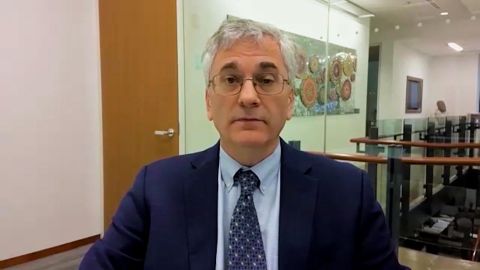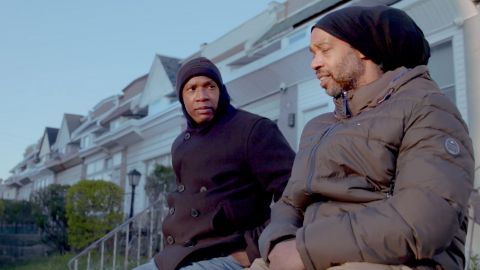JUDY WOODRUFF: Efforts to fix problems with the nation's criminal justice system, including
taking a closer look at what to do about teenagers who commit minor crimes.
Our "NewsHour" Shares tonight looks at one program in Newark, New Jersey, which offers
an alternative to jail for minors.
From our Student Reporting Labs at Philip Academy Charter School, 12-year-old Yasmeena
Sharif reports.
WOMAN: All rise for the honorable judge.
YASMEENA SHARIF: If this looks like a real-life courtroom, that's because it is.
At the Newark Youth Court in New Jersey, teenagers are the judge, jury, plaintiff, and defendants.
JASMINE HARDEN, Program Coordinator, Newark Youth Court: The high school students are
really running the show.
YASMEENA SHARIF: Jasmine Harden is the program coordinator.
JASMINE HARDEN: When students walk into Youth Court, you're seeing your peers, so you're
seeing students that look just like you.
YASMEENA SHARIF: But this court is unique, offering a chance for introspection.
For young people who have committed minor first-time offenses, like truancy, fighting,
or vandalism, Youth Court is an alternative to youth incarceration.
JASMINE HARDEN: We're giving the student the opportunity to sit on the stand and talk to
us about them.
Are they remorseful about what happened?
What would they do differently?
And then the student leaves with some restorative sanctions.
So, this could be community service, a workshop, jury duty, a letter of apology, or an essay
where it applies.
YASMEENA SHARIF: For a young adult who is accused of a minor offense, the police, a
school official or a judge in a preliminary hearing can refer the defendant to the Youth
Court for trial.
Here, a jury of their peers decides their punishment.
Shantae was first referred to the Youth Court for harassing a classmate online.
SHANTAE, Former Youth Court Respondent: I was actually getting bullied in school, and
then I actually turned into a bully trying to react to the person, even though I knew
it wasn't the right way.
But there was no other way to defend myself.
YASMEENA SHARIF: For her sentence, she was assigned community service and a letter of
apology to the student she bullied.
SHANTAE: And the whole time I was at Youth Court, I never felt like anyone was against
me.
You actually feel safe, and in an environment where you can talk and communicate with people
just like you.
YASMEENA SHARIF: Her positive experience led her to become a member of the Youth Court.
Talethea Parker is a volunteer juror.
TALETHEA PARKER, Youth Court Member: I just feel like, when you walk in there, you're
not expecting youth to be sitting there on a judge seat, as the bailiff, as the youth
advocate or the community advocate.
You are expecting adults to be there.
So, I just feel like they are more comfortable telling their story.
YASMEENA SHARIF: This model allows young people to resolve conflict outside the justice system,
leaving them free of a criminal record.
Andrea McChristian is an associate counsel at the New Jersey Institute For Social Justice.
ANDREA MCCHRISTIAN, Associate Counsel, New Jersey Institute for Social Justice: So, here
in New Jersey, we have the worst black/white youth incarceration disparity rate in the
entire nation.
YASMEENA SHARIF: McChristian authored a report that argued that youth incarceration in New
Jersey is costly and ineffective.
ANDREA MCCHRISTIAN: We need to look at the racial disparities, look at how we can keep
those kids from not getting system-involved in the first place, and that's through diversion
programs like Youth Court.
YASMEENA SHARIF: That certainly proved true for Shantae.
SHANTAE: This experience has definitely changed me, because it's definitely shown me, like,
there's another side to this world, and that everybody is meant to be heard.
Even if you don't feel like your opinion matters, everybody's opinions matter.
And you just never know what you will bring to the table.
It's all up to you.
YASMEENA SHARIF: For the "PBS NewsHour"'s Student Reporting Labs, I'm Yasmeena Sharif
in Newark, New Jersey.
JUDY WOODRUFF: Twelve-year-old Yasmeena Sharif.
We thank you.
And tune in all next week.
We will be hearing from "NewsHour" correspondents across the country for our series The Future
of Work.



